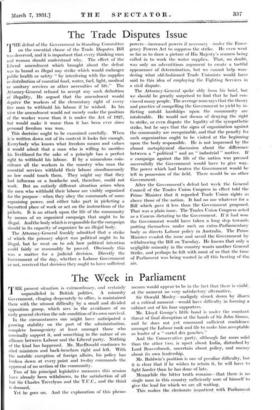The Trade Disputes Issue
rcHE defeat of the Government in Standing Committee on the essential clause of the Trade. Disputes Bill was deserved, and it is important that every thinking man and woman should understand why. The effect of the Liberal amendment which brought about the defeat was to brand as illegal any strike which would endanger, public health or safety " by interfering with the supplies or distribution of essential food, water, fuel, light, medical or sanitary services or other necessities of life." The Attorney-General refused to accept any such definition of illegality. He argued that the amendment would deprive the workers of the elementary right of every free man to withhold his labour if he wished. In his view the amendment would not merely make the. position of the worker worse than it is under the Act of 1927, but would make it worse than it has been ever since personal freedom was won.
This doctrine ought to be examined carefully. When it is written down out of its context it looks fair enough. Everybody who knows what freedom means' and values it would adthit that a man litho is willing to sacrifice his livelihood for the sake of a principle -has a perfect right to withhold his labour. If by a miraculous coin- cidence all the workers in the country who man the essential services withheld their labour simultaneously no law could touch them. They might say that- they had influenza or a headache and, therefore, could not work. But an entirely different situation arises when the men who withhold their labour are visibly organized for the purpose—when they obey the commands of some organizing power, and either take part in picketing a boycotted place of work or act on the instructions of the pickets. It is an attack upon the life of the community by means of an Organized campaign that ought to be illegal. And the body which is responsible for the campaign should in its capacity of organizer be an illegal body.
The Attorney-General frankly admitted that a strike of which the primary object was political ought to be illegal, but he went on to- ask how political intention could fairly or reasonably be proved. Obviously this was a matter for a judicial decision. Directly the Government of the day, whether a Labour Government or not, received that decision they ought to have sufficient Powers—increased powers if necessary —under the Emer- gency Powers Act to suppress the strike. He even went so far as to draw a picture of His Majesty's seamen .being. called in to work the water supplies. That, no doubt, was only an adventitious argument to create a tactful. appearance of. determination, but we cannot help won- dering what old-fashioned Trade Unionists would have said to this idea of employing the Fighting Services in a civil dispute.
The Attorney-General spoke ably from his brief, but we should be greatly surprised to find that he had con- vinced many people. The average man says that the theory and practice of compelling the Government to yield by in- flicting untold hardships upon the community arc intolerable. He would not dream of -denying the right to strike, or even dispute the legality of the sympathetic strike, but he says that the signs of organization against the community are recognizable, and that the penalty for such organization ought to be visited at the beginning • upon- the body responsible. He is not impressed by the almost metaphysical discussion about the difference between a " political " and an " industrial " motive. If a caMpaign against the life of the nation was pressed successfully the Government would have to give way. The power which had beaten the Government would be left in possession of the field. There would -be no other Government.
After the Government's defeat last week the General Council of the Trades Union Congress in effect told the Prime Minister that it regarded Trade Union rights as above those of the nation. It had no use whatever for a Bill which gave it less than the Government proposed. That was a plain issue. The Trades Union Congress acted as a Caucus dictating to the Government. If it had won the Government would have taken a long step towards putting themselves under such an extra-Parliamentary body as directs Labour policy in Australia. The Prime Minister evaded the issue and saved the Government by withdrawing the Bill on Tuesday. He knows that only a negligible minority in the country wants another General Strike, and perhaps he felt with most of us that the time of Parliament was being wasted in all this beating of the air.


























































 Previous page
Previous page